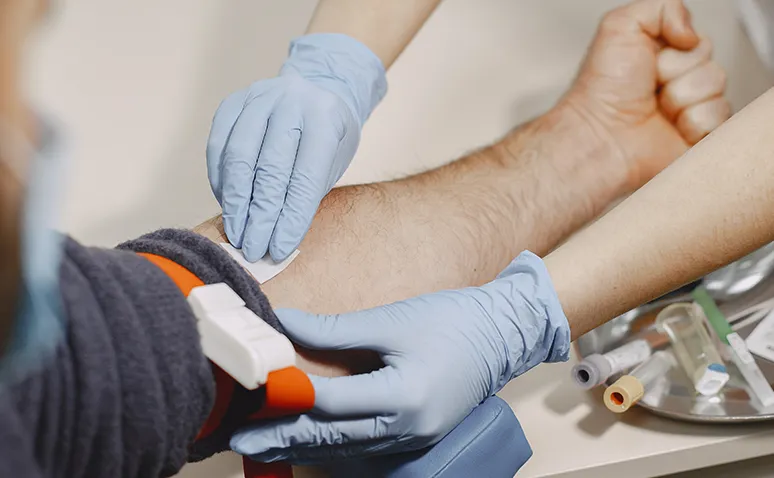Chlamydia infection is a sexually transmitted disease and it may progress without showing obvious symptoms. Being a bacterial infection, it can lead to pelvic inflammatory disease in women and prostatitis in men. If not diagnosed early, it can cause serious health issues like infertility.
Chlamydia infection spreads through unprotected sexual contact, and those who are infected may unknowingly transmit the disease to others. This infection can be treated with antibiotics. However, there is a risk of reinfection. Therefore, regular check-ups and preventive measures are important.
The health problems that may arise due to this infection are as follows:
- Pelvic inflammatory disease (PID) in women
- Risk of infertility
- Ectopic pregnancy
- Prostatitis in men
- Urethritis (inflammation of the urethra)
- Pain during sexual intercourse
- Eye infections (conjunctivitis)
- Infections transmitted during childbirth in newborns (eye infection or pneumonia)

What is Chlamydia?
Chlamydia infection is part of the sexually transmitted diseases group and is caused by the bacterium Chlamydia trachomatis. This disease, which usually shows no symptoms, spreads through unprotected sexual contact.
What is chlamydia and how does it spread?
The disease spreads when the bacterium enters the body during sexual intercourse. In women, it can damage the cervix, fallopian tubes, and reproductive organs, while in men, it can affect the urethra and prostate. Chlamydia trachomatis infection can be transmitted from mother to baby during childbirth, leading to serious health problems in newborns. Babies may develop pneumonia or eye infections due to the transmission of this bacteria during birth.
Among sexually transmitted diseases, this is one of the most common, and early diagnosis is crucial for effective treatment. Since it is often asymptomatic, infected individuals may unknowingly transmit the infection to others. In women, it can lead to pelvic inflammatory disease (PID), infertility, and ectopic pregnancy, while in men, it can cause prostatitis and urethritis.
Treatment is possible with antibiotics, and the infection can be completely cured if treated in its early stages. However, during the treatment process, sexual partners should also be checked and treated. Otherwise, the risk of reinfection is high. To prevent the spread of the disease, regular screenings and safe sexual practices (such as condom use) are recommended. In cases where individuals are diagnosed, they should avoid sexual activity during treatment and inform their partners.

Chlamydia Symptoms
Chlamydia trachomatis is a sexually transmitted infection that often progresses without symptoms. As a result, most people who are infected may live without knowing they have the disease for a long time.
In women, the symptoms can include vaginal discharge, burning during urination, pain during sexual intercourse, and discomfort in the lower abdomen. Additionally, Chlamydia trachomatis infection can lead to more serious health issues like pelvic inflammatory disease (PID), which causes abdominal pain and fever.
In men, the symptoms include burning during urination, discharge from the tip of the penis, and swelling or tenderness in the testicles. In both genders, if Chlamydia trachomatis comes into contact with the eyes, it can cause conjunctivitis (eye inflammation). However, since the disease is often asymptomatic, most patients do not experience these symptoms or have mild cases.
If symptoms are present, it is important to consult a healthcare professional without delay. If left untreated, it can lead to serious reproductive health issues. Early diagnosis and treatment play a crucial role in preventing the spread of the disease.
Since Chlamydia trachomatis is a sexually transmitted infection, it spreads through sexual contact between individuals. Contracting the infection from a toilet is extremely unlikely, as the bacteria cannot survive long outside the human body. Therefore, it is improbable for Chlamydia trachomatis to be transmitted through shared toilets or similar surfaces. To prevent infection, protective measures (such as using condoms) are more effective when it comes to sexually transmitted diseases.
While tests for Chlamydia trachomatis might seem possible with home kits, the accuracy and reliability of these tests are not always guaranteed. The most reliable method for correctly diagnosing an infection is to perform laboratory tests under professional supervision.
With home tests, there is a risk of incorrect sample collection or misinterpretation of the results, leading to inaccurate outcomes. Therefore, it is strongly advised to consult a healthcare provider for the diagnosis and treatment of serious infections like this one. Tests performed by professionals ensure accurate diagnosis and an appropriate treatment plan.
Chlamydia trachomatis is not an infection that resolves on its own. If left untreated, it can lead to more serious health problems. In women, it can result in infertility and pelvic inflammatory disease (PID). This infection can be fully cured with appropriate antibiotic treatment. Therefore, individuals showing symptoms or those at risk of infection should seek medical attention for proper diagnosis and treatment.











